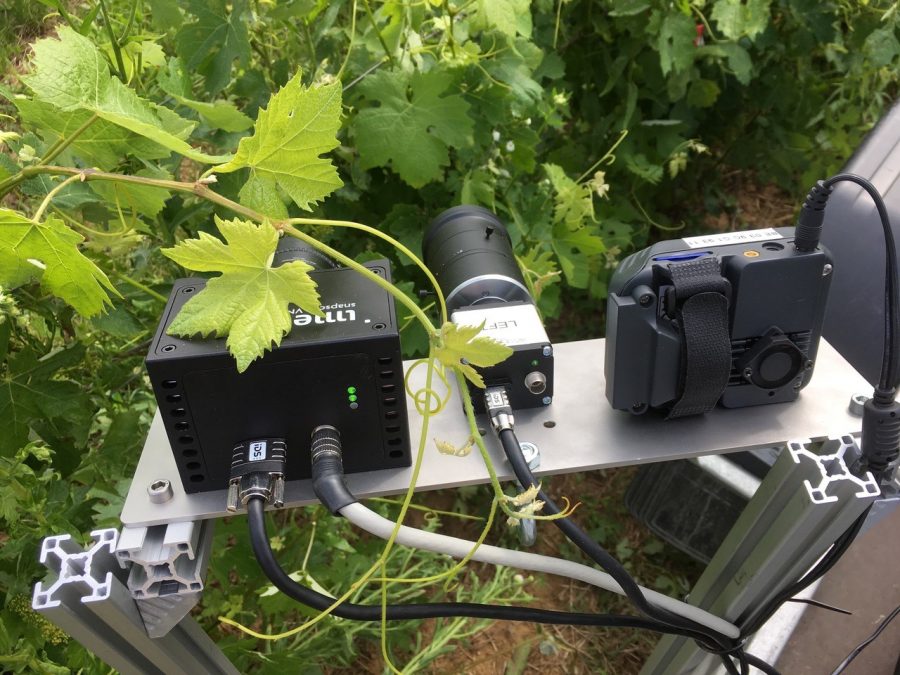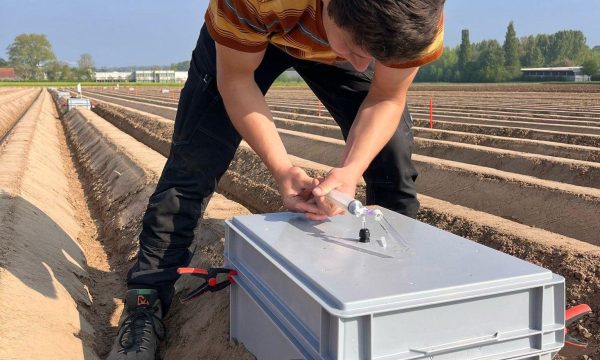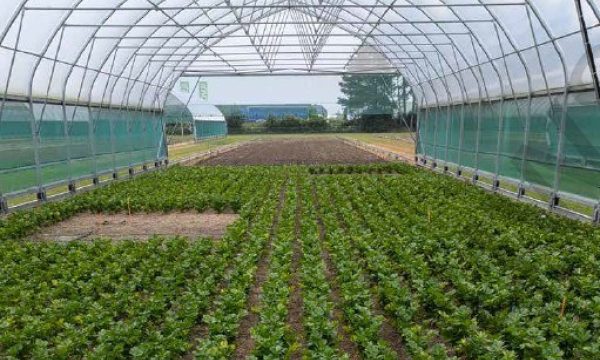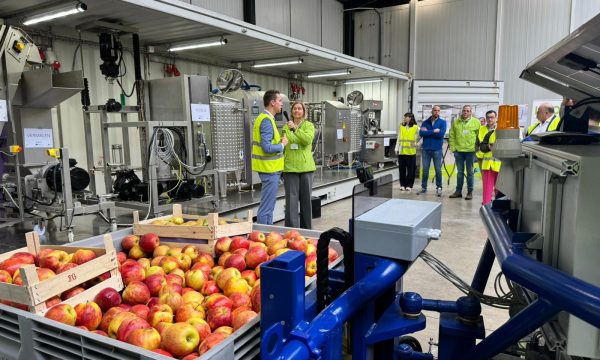Press release Smarter spray technology shows promise for reduction of plant protection products

De markt van slimme spuittoestellen die gewasbeschermingsmiddelen (GBM) veel lokaler en preciezer kunnen aanbrengen is in volle ontwikkeling. Het Europees Horizon2020 project OPTIMA, waarin ILVO een belangrijke partner is, zet mee in op deze ontwikkeling. “We trekken de kaart van een ambitieus holistische IPM aanpak waarbij niet enkel precieze spuittechnieken, maar ook ziektevoorspellingsmodellen, ziektedetectiesystemen, én het gebruik van nieuwe biologische GBM centraal staan,” zegt Ingrid Zwertvaegher, ILVO onderzoeker.OPTIMA boekte reeds interessante vooruitgang op vier vlakken:
The market for smart sprayers that apply plant protection products (PPP) more locally and more precisely is developing fast. The European Horizon project "OPTIMA", where ILVO is an important partner, is helping with the development. "We aim for an ambitious IPM approach where not only precision spray technology but also disease prediction models, disease detection systems, and the use of new biological PPPs play a central role," says Ingrid Zwertvaegher, ILVO researcher. OPTIMA has already booked important progress on four fronts:
- een beslissingsondersteunend systeem dat ziektevoorspellingsmodellen integreert en het risico op ziekte uitbraken bepaalt,
- een draagbaar, geavanceerd detectiesysteem dat op basis van spectrale beelden schimmelinfecties lokaliseert en kwantificeert in vollegrondsgroenten (wortel) of bij meerjarige gewassen (appel en druif),
- slimme spuittoestellen die deze applicaties integreren en vertalen naar een variabele dosering en uitgerust zijn met communicatiesystemen die realtime connecteren met sensoren voor gewasdetectie, automatisch gestuurde luchtondersteuning, of een systeem bezitten met variabele dopafstand naargelang het groeistadium van het gewas,
- de selectie van nieuwe biologische GBM en resistentie-inductoren voor een aantal plantenziekten.
- a decision-support system that integrates disease prediction models and determines the risk of disease outbreaks;
- a portable, advanced detection system that uses spectral imaging to localize and quantify fungal infections in open-air (carrot) or multi-year crops (apple and grape);
- smart spray technology that integrates these applications and translates them into a variable dosage, equipped with communication systems that connect in real time with sensors for crop detection, automatically driven air support, or have a system with a variable nozzle distance depending on the growth phase of the crop;
- the selection of new biological pesticides and resistance-inductors for a number of plant diseases.
EU ambitious about pesticide reduction
The H2020 project OPTIMA (Optimized integrated crop protection through accurate detection and control of plant diseases in perennial crops and field vegetables) started in late 2018 as a consortium of 15 partners (research institutions including ILVO, agricultural organizations, advisory services and industry from across Europe), led by the Agricultural University of Athens. With €3.5 million in funding for OPTIMA, the EU is targeting innovative solutions to reduce the negative effects of the use of plant protection products (PPP) in the cultivation of fruits (apple and grape) and vegetables (carrot). This should lead to lower residues and a reduced impact on the environment and human health. The project ends in late 2021.
"A holistic, integrated approach has been worked on that includes all critical aspects related to integrated disease management, such as the use of novel, biological PPP, disease prediction models, spectral early disease detection systems, and precision spray techniques. The project thus hopes to contribute to a reduced dependence on chemical pesticides in European agriculture through reduced use." says David Nuyttens of ILVO.
Focus on variable dosage
A perfect sprayer should apply a precise amount of active ingredient evenly and exclusively to the target. Ideally, only the exact (minimum) amount of product needed to achieve the desired biological effect would be released, and all of the product being sprayed would reach the desired target. Achieving this goal is a challenge for spray applications in agriculture. Nuyttens: "Technologically, we have reached the stage where sprayers can take into account the presence of pests and diseases, the plant system, the crop density or other characteristics of the crop or foliage. The machines can therefore adapt the applied dose to the need."
ILVO is working within OPTIMA mainly on the technological optimization and development of the spraying techniques.
Large-scale field trials planned in 2021
"In 2020, due to the COVID-19 pandemic, only a limited number of field trials could take place. The intense focus shifted to constructing the smart sprayers. A whole series of trials are planned in 2021, both in France (carrots), in Italy (vineyards) and in Spain (apple orchards), to determine their efficiency. The results will also be used in a life cycle analysis and risk analysis to assess the health, environmental and socio-economic impacts of the IPM approach. Demonstrations with the spraying equipment are also planned in the countries concerned. The further course of the COVID-19 pandemic will determine how these will take place," says Ingrid Zwertvaegher.
Three cases, three countries: different achievements through intensive cooperation
Apple in Spain
De Spaanse machinefabrikant Pulverizadores Fede optimaliseerde in nauwe samenwerking met de Universiteit van Catalonië (UPC) zijn Smartomizer H3O spuittoestel. Dit toestel is bekroond met het ‘Efficient Solution’ label door Solar Impulse. Deze werd uitgerust met ultrasone sensoren voor gewasdetectie en elekrische kleppen voor variabele spuittoepassingen.
The Spanish machine manufacturer Pulverizadores Fede, in close cooperation with the University of Catalonia (UPC), optimized its Smartomizer H3O sprayer . This device was awarded the 'Efficient Solution' label by Solar Impulse. It was equipped with ultrasonic sensors for crop detection and electric valves for variable spray applications.
Grape in Italy
Om te komen tot het slimme spuittoestel voor wijngaarden werd vertrokken van de Synthesis van de Italiaanse machinefabrikant Caffini, die samen met de Universiteit van Turijn (UNITO) werd voorzien van ultrasone sensoren voor gewasdetectie, een PWM-systeem voor variabele spuittoepassing, en de erg vernieuwende elektrische ventilator die toelaat de luchtondersteuning te sturen op basis van de densiteit van het gewas. Het toestel ontving hiervoor de ‘Blue Award’ voor oplossingen die uitblinken in ecologische aspecten op de EIMA beurs in 2020.
The smart sprayer for vineyards started from the Synthesis from the Italian machine manufacturer Caffini, which together with the University of Turin (UNITO) was equipped with ultrasonic sensors for crop detection, a PWM system for variable spray application, and the highly innovative electric fan that allows the air support to be controlled according to the density of the crop. For this, the unit received the 'Blue Award' for solutions that excel in ecological aspects at the 2020 EIMA fair.
Carrot in France
The field sprayer also comes from manufacturer Caffini. For the case on carrot, they partnered with the French agricultural research institute INRAE. The Prestige sprayer was equipped with an electric fan for variable air support. The biggest innovation here is a system whereby the nozzle distance can be adjusted according to the growth stage of the crop, in order to reduce losses to the ground. 'At the early growth stage, we were able to reduce fungicide or insecticide losses to the soil by as much as 75%.'
This year, in 2021, we test all of these innovations, together with the disease prediction models and the selected biological pesticides, in the field.
More information
For more info, visit the OPTIMA website: http://optima-h2020.eu.
Follow the project on Twitter, Facebook, LinkedIn en Instagram!


